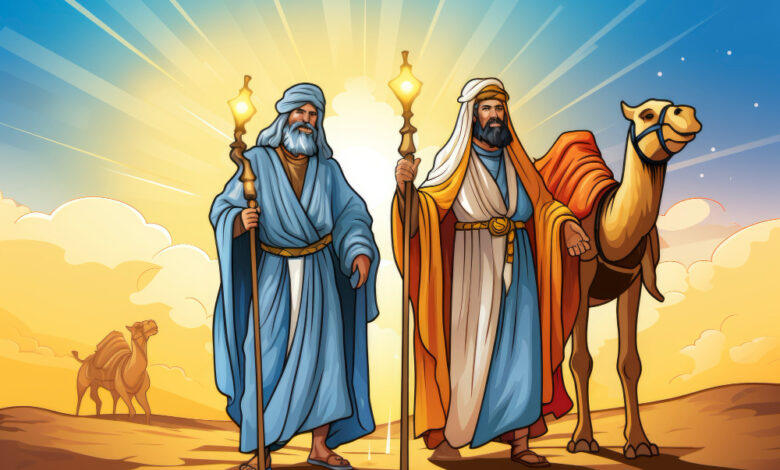The 12 Murid Yesus: An In-Depth Study of the Twelve Disciples of Jesus

In the annals of Christian history, the “12 Murid Yesus” or the Twelve Disciples of Jesus hold a prominent and foundational place. These twelve individuals were not merely followers but key figures in the establishment and expansion of Christianity. This article delves into their lives, significance, and the impact they had on the early church, providing a thorough understanding of their roles and contributions.
Who Were the 12 Murid Yesus?
The term “12 Murid Yesus” refers to the twelve men chosen by Jesus Christ to be His closest disciples. Their primary roles were to learn from Jesus, witness His teachings and miracles, and later, to spread His message. Each of these disciples brought unique attributes and experiences to their mission, shaping the early Christian church in diverse ways.
1. Simon Peter (Petrus)
Simon Peter, originally named Simon, is perhaps the most well-known among the 12 Murid Yesus. A fisherman by trade, Peter was called by Jesus to become a “fisher of men.” Jesus gave him the name Peter, meaning “rock,” indicating his future role as a foundational leader in the church. Peter’s life is marked by significant events, including his denial of Jesus and subsequent reinstatement. His letters, 1 Peter and 2 Peter, provide insight into early Christian teachings and are pivotal to the New Testament.
2. James the Greater (Yakobus)
James the Greater, the son of Zebedee and brother of John, is another prominent member of the 12 Murid Yesus. Known for his fiery zeal and close association with Jesus, James was part of Jesus’ inner circle. He witnessed key events such as the Transfiguration and the Garden of Gethsemane. His martyrdom by sword, as recorded in Acts 12:1-2, underscores his unwavering faith and commitment to the gospel.
3. John (Yohanes)
John, the brother of James, is often referred to as the “beloved disciple.” He is traditionally credited with writing the Gospel of John, along with the Epistles of John and the Book of Revelation. John’s writings offer profound theological insights and a unique perspective on Jesus’ life and teachings. His enduring presence and influence in the early church are significant, as he is believed to have lived to an old age, spending his later years in Ephesus.
4. Andrew (Andreas)
Andrew, the brother of Peter, was also a fisherman before he became one of the 12 Murid Yesus. Known for bringing Peter to Jesus, Andrew’s role as an early evangelist is noteworthy. His missionary work is believed to have taken him to regions such as Greece and Asia Minor. Tradition holds that he was martyred by crucifixion on an X-shaped cross, now known as St. Andrew’s Cross.
5. Philip (Filipus)
Philip, hailing from Bethsaida like Peter and Andrew, is mentioned in the Gospels primarily in connection with his role in the feeding of the 5,000 and his introduction of Nathanael to Jesus. Philip’s later missionary activities are less documented, but he is traditionally associated with spreading the gospel in regions such as Asia Minor and Greece. His contributions to early Christianity are reflected in his evangelistic efforts.
6. Bartholomew (Bartolomeus or Nathanael)
Bartholomew, often identified with Nathanael in the Gospel of John, is known for his initial skepticism about Jesus but later became a devoted follower. Tradition suggests that he preached in various regions, including India and Armenia, where he ultimately faced martyrdom. His story exemplifies the transformative impact of encountering Jesus and the dedication that followed.
7. Matthew (Matius)
Matthew, also known as Levi, was a tax collector before becoming one of the 12 Murid Yesus. His transformation from a tax collector to a disciple highlights the inclusive nature of Jesus’ ministry. Matthew is credited with writing the Gospel of Matthew, which emphasizes Jesus as the fulfillment of Old Testament prophecies. His subsequent missionary work is believed to have included travels to Ethiopia and Persia.
8. Thomas (Tomas)
Thomas, also known as Didymus, is best remembered for his doubt regarding Jesus’ resurrection until he could see and touch Jesus’ wounds. This story, often referred to as “Doubting Thomas,” led to a profound declaration of faith when he called Jesus “My Lord and my God.” Thomas is traditionally believed to have traveled to India, where he established Christian communities and was martyred.
9. James the Lesser (Yakobus)
James the Lesser, the son of Alphaeus, is distinguished from James the Greater. Although less is known about his life and ministry, James the Lesser’s inclusion among the 12 Murid Yesus signifies his importance in the early church. Various traditions suggest that he preached in places like Egypt and was eventually martyred.
10. Thaddaeus (Tadeus or Judas, the son of James)
Thaddaeus, also known as Judas, the son of James, is noted for his question during the Last Supper about why Jesus would reveal Himself to the disciples and not to the world. His role in the early church is less documented, but he is traditionally associated with missionary work in Syria and Persia. Thaddaeus’ contributions to the early spread of Christianity are an important aspect of his legacy.
11. Simon the Zealot (Simon dari Zelot)
Simon the Zealot is associated with the Zealots, a Jewish political movement that sought to overthrow Roman rule. His transition from a political zealot to a devoted follower of Jesus highlights the transformative nature of Jesus’ message. Simon’s later missionary activities are less detailed, but his inclusion among the 12 Murid Yesus reflects the diverse backgrounds of Jesus’ disciples.
12. Judas Iscariot (Yudas Iskariot)
Judas Iscariot is perhaps the most infamous of the 12 Murid Yesus due to his betrayal of Jesus. He identified Jesus to the authorities for thirty pieces of silver, leading to Jesus’ arrest and crucifixion. Judas’ tragic end, taking his own life after the betrayal, serves as a somber reminder of the complexities of human nature and the consequences of moral choices.

The Legacy of the 12 Murid Yesus
The 12 Murid Yesus were instrumental in laying the foundations of Christianity. Their diverse backgrounds, personal transformations, and unwavering commitment to Jesus’ mission played a crucial role in the development and spread of the Christian faith.
Theological Significance
The teachings and experiences of the 12 Murid Yesus have profoundly shaped Christian theology. Their writings and actions helped define core Christian doctrines and practices, contributing to the formation of the New Testament and early church teachings.
Apostolic Succession
The concept of apostolic succession, the transmission of spiritual authority from the apostles to subsequent church leaders, is a key aspect of many Christian traditions. The 12 Murid Yesus established a model for church leadership and authority that continues to influence Christian ecclesiastical structures.
Missionary Work and Evangelism
The missionary efforts of the 12 Murid Yesus were pivotal in spreading the Christian message across the Roman Empire and beyond. Their journeys and evangelistic activities established Christian communities and laid the groundwork for the global expansion of Christianity.
Conclusion
The 12 Murid Yesus are not merely historical figures but symbols of faith, dedication, and the transformative power of Jesus’ teachings. Their lives, sacrifices, and contributions have left an enduring legacy in the history of Christianity. As we explore their stories and impact, we gain a deeper appreciation for the early church’s foundations and the continuing influence of their mission.
Their diverse backgrounds and individual contributions reflect the richness of early Christianity and the profound impact that Jesus’ message had on His followers. The 12 Murid Yesus’ commitment to spreading His teachings remains an inspiration for Christians around the world, affirming their place as central figures in the history of faith.





